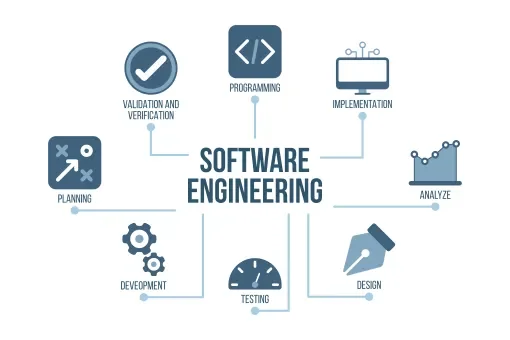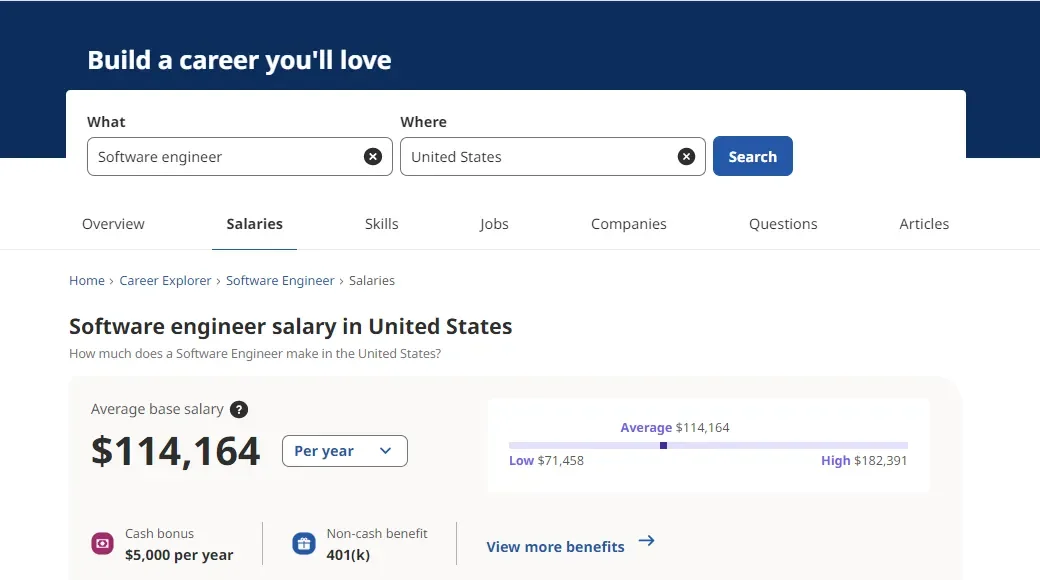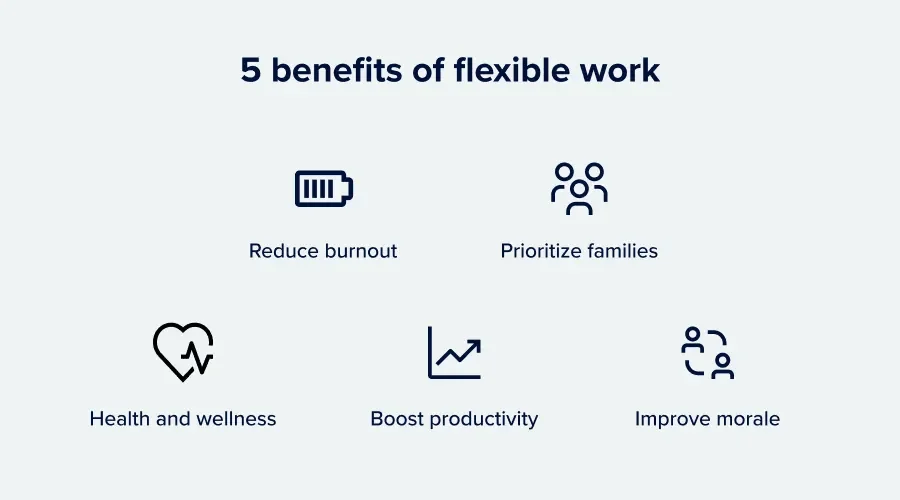If you're wondering how to become a software engineer, you're not alone. Because of the vast array of opportunities for growth and innovation it offers, software engineering has become one of the most promising and sought-after careers today. It demands both creativity and analytical thinking which makes it an ideal profession for those who love to solve problems and build things that make a difference.
But the path to becoming a successful software engineer can be challenging especially for people just starting in the software development field. Employers often look for candidates with a combination of education, experience, and technical skills which makes it even more difficult for aspiring software engineers who are trying to break into the industry
To help you with this challenge, we have prepared today’s guide that highlights 7 essential steps you need to take for building a successful career in software engineering and discusses how long it takes to become a software engineer.
By the end of this article, you'll have a clear roadmap to follow and you'll also get a clear understanding of the various roles and responsibilities of a software engineer.
What Is A Software Engineer And Why Should You Consider Becoming One?

A software engineer is someone who applies principles of computer science, engineering, and mathematical analysis to design, develop, and maintain software applications and systems. They work closely with other engineers, product managers, designers, and stakeholders to understand user needs and develop software solutions that meet those needs.
Software engineers are responsible for creating software that meets the needs of users, is efficient, reliable, and easy to use. They work on a wide range of software, including mobile apps, desktop applications, web applications, and embedded systems.
If you are wondering why you should consider a career in software engineering, here are some key reasons that make it a promising and rewarding profession.
I. High Demand And Good Salary

The demand for software engineers is increasing day by day because of the growing need for software applications in every sector of the economy. This high demand also means that software engineers enjoy excellent salaries, with the average salary for software engineers in the United States being $114,164 per year.
II. Exciting And Dynamic Work
Software engineering is a field that is constantly evolving and software engineers play a crucial role in shaping this evolution. They get to work on exciting and challenging projects that require complex problem-solving skills, designing new systems, and creating innovative solutions. This offers software engineers a thrilling work experience that keeps them motivated and engaged.
III. Flexible Work Environment

Software engineering is a profession that offers a high degree of flexibility. Many software engineers work remotely or have flexible working hours which enables them to achieve a better work-life balance. This flexibility allows software engineers to work in environments that suit them best which ultimately results in improved productivity and job satisfaction.
IV. High Job Satisfaction
Software engineers get to experience high levels of job satisfaction by seeing tangible results from their work. They can often make a significant impact on people's lives by creating software that solves real-world problems. This fulfillment adds to the excitement of the job, making software engineering a rewarding profession.
V. Opportunity For Growth
Software engineering offers numerous opportunities for growth and advancement. With experience and expertise, software engineers can progress to leadership roles, work on more complex projects, or even start their own companies. This allows software engineers to continuously challenge themselves and explore new possibilities, making software engineering a field of endless opportunities.
Now that we have seen why software engineering is one of the most sought-after professions, let’s discuss the steps that are essential for building a career in it.
7 Proven & Tested Steps To Becoming A Skilled Software Engineer
Here’s how you can master the art and become a successful software engineer.
Step 1: Determine Your Career Goals & Path
To become a software engineer, have a clear understanding of your career goals and the path you want to take. Software engineering is a diverse field with many different career paths and specialties. So it's important to determine which areas you are most interested in and where you want to focus your efforts.
Some of the most common career paths in software engineering include:
- Data Engineer
- Game Engineer
- DevOps Engineer
- Software Architect
- Software Developer
- Full-stack Engineer
- Technical Project Manager
- Quality Assurance Engineer
Once you understand the different career paths and specialties within software engineering, reflect on your own goals and interests. Consider asking yourself the following questions:
- What are my long-term career goals?
- What type of work environment do I thrive in?
- Do I prefer working independently or in a team?
- What type of impact do I want to make through my work?
- What types of software applications or technologies am I most interested in?
By reflecting on these questions and others, you can understand your interests better and what type of software engineering career path might be the best fit for you.
Step 2: Learn The Fundamentals Of Computer Science
Learning the fundamentals of computer science is a crucial step to becoming a software engineer as it provides a strong foundation of knowledge and skills that can be applied to a variety of programming languages and technologies. Some of the key topics to focus on include:
- Algorithms and data structures: These are the building blocks of computer programs and involve understanding how to store, retrieve, and manipulate data efficiently.
- Programming languages and software design patterns: These concepts are essential to writing clean, scalable, and maintainable code.
- Computer architecture and operating systems: Understanding how hardware and software interact can help you write more efficient code that takes advantage of the underlying hardware.
Explore resources to learn the fundamentals of computer science. Online platforms like Coursera, edX, and Udacity offer a range of courses on computer science topics. Online communities like Stack Overflow can provide support and guidance when you get stuck.
Step 3: Choose A Programming Language & Start Coding

You can choose from a variety of programming languages to choose from. Each language has its own strengths and weaknesses. Some of the most popular coding languages are:
- Ruby: Used for web development, building web applications, and scripting.
- Python: Used for data analysis, artificial intelligence, web development, and scripting.
- JavaScript: Used for web development, creating dynamic websites, and building mobile apps.
- C++: Used for developing operating systems, game development, and high-performance software.
- Java: Used for developing enterprise-level applications, Android apps, and web applications.
When choosing a programming language to specialize in, consider your career goals, interests, and the demand for the language in the job market. Pick a language that is widely used, has a strong community, and you enjoy working with.
Platforms like Codecademy, Udemy, and edX offer a range of online courses on programming languages, from beginner to advanced levels. YouTube is another great platform for learning to code, with a vast array of resources readily accessible to users.
Code editors like Visual Studio Code and IDEs like Eclipse can also help you write and debug code more efficiently. Joining online communities like GitHub, Stack Overflow, and Reddit can provide you with access to a community of software developers who can help you learn and answer your questions.
Step 4: Develop Your Technical Skills & Get Certifications
To become a software engineer, have a solid understanding of programming concepts and software development processes. Similarly, understanding agile development methodologies, continuous integration and delivery, and software testing frameworks is also critical for delivering high-quality software.
To stay current with the latest trends and technologies in software engineering, you should continuously learn software engineering skills and expand your knowledge. Certifying your software engineering skills is an excellent way to validate your technical abilities and showcase your expertise to potential employers. You can get certified with:
- Certified Software Development Professional (CSDP): Offered by IEEE, this certification focuses on software engineering principles and practices.
- Certified Software Development Associate (CSDA): This certification is provided by ISTQB and validates your understanding of software development concepts and principles.
- Certified Software Development Master (CSDM): Offered by the Scrum Alliance, this certification focuses on agile development methodologies and project management.
If you need practice, you can leverage sites like ProProfs, Microsoft PL-300 Dumps, or TestGoriila to prepare for your exam certifications.
Step 5: Seek Mentorship & Networking Opportunities
Seeking mentorship and networking opportunities can be invaluable in the software engineering field. They can bring many benefits to software engineers like:
- Getting feedback and advice on your work.
- Finding job opportunities and career advice.
- Building long-lasting professional relationships.
- Gaining insights and knowledge from experienced professionals.
However, finding a mentor or building a network can be challenging, especially for those new to the field. One way to go about it is to attend local meetups and events related to software engineering to meet professionals in the field.

You can also join online communities like Reddit, Stack Overflow, and GitHub to connect with other developers and participate in discussions. Attending conferences like Code BEAM, AWS re:Invent, and Google I/O are great ways to connect with professionals and learn about the latest trends and technologies.
Once you've built your network, maintain and nurture your professional relationships. Stay in touch with your network regularly and offer help and support when you can, such as sharing job opportunities or providing feedback on their work.
Step 6: Create a Portfolio & Personal Brand
Your portfolio is a collection of projects that showcase your technical software engineer skills, creativity, and problem-solving abilities. It allows potential employers to see what you are capable of and provides them with a glimpse of your work style. A strong portfolio can set you apart from other job candidates and increase your chances of getting hired.
Here are some expert advice for creating a portfolio:
- Showcase your best work: Choose projects that showcase your best work. Make sure to include both personal and professional projects.
- Provide context: Explain your role in each project, the problem you were trying to solve, and how you approached the problem.
- Use a clean and organized layout: Your portfolio should be easy to navigate and visually appealing. Use a clean and organized layout that showcases your work.
- Keep it up-to-date: Keep your portfolio up-to-date with your latest projects and skills.
On the other hand, your personal brand is your professional identity. It is how people perceive you in the industry. A strong personal brand can help you establish yourself as an expert in your field, gain recognition, and increase your professional opportunities. A personal website can serve as a central hub for your professional brand.
Step 7: Search For Jobs & Prepare For Job Interviews
Job search engines like Indeed and Glassdoor can help you find job openings. You can also look for job openings on company websites.
Reach out to your network and let them know that you are looking for job openings. Attend networking events such as meetups and conferences to meet new people and learn about new job opportunities.

Aloa is a great option for software engineers to build their careers. We are known for our cutting-edge technology and commitment to innovation, providing software engineers with the opportunity to work on challenging and exciting projects that push the boundaries of what is possible in the industry.
We also place a strong emphasis on employee development and provide software engineers with ongoing training and career development opportunities. Additionally, Aloa has a strong work culture that fosters collaboration, inclusivity, and a sense of community which creates a supportive and welcoming environment for software engineers.
The software engineering job interview process can be rigorous and it is important to approach it with confidence and preparation. It typically consists of two types of interviews: technical and behavioral. Technical interviews assess your problem-solving and coding abilities while behavioral interviews assess your soft skills and cultural fit.
Here are some tips for preparing for these interviews:
- Practice coding challenges: Practice coding challenges to improve your coding skills and problem-solving abilities. Websites like HackerRank and LeetCode offer coding challenges and practice problems.
- Research the company and the position: Research the company and the position to understand the company culture, values, and goals. This can help you prepare for the behavioral interview.
- Prepare questions to ask the interviewer: Prepare questions to ask the interviewer to demonstrate your interest in the position and the company.
Once you receive the offer, evaluate the entire compensation package, including benefits and equity, to determine if it meets your needs and expectations.
How Long Does It Take To Become A Software Engineer From Scratch?
Generally speaking, most self-taught software engineers take around 6 to 12 months to learn the basics and start building simple projects. It can take another year or two of dedicated learning and practice to become proficient enough to land a job as a software engineer.
Those who pursue a formal education, such as a computer science degree, typically take around four years to complete their studies and enter the workforce as software engineers.
Here are some factors that can impact the timeline of becoming a good software engineer:
- Learning resources: The quality and availability of resources, such as online software engineering courses, books, and tutorials, can impact how quickly you can learn.
- Educational background: If you have a degree in computer science or a related field, you can have a head start in learning software engineering concepts.
- Personal motivation and dedication: Consistently dedicating time to learning and practicing coding is crucial for progress.
- The complexity of the software engineering discipline: Software engineering is a broad field with many sub-disciplines, some of which may be more complex and take longer to master than others.
With an understanding of the time it takes to become a software engineer, let’s now explore some of the significant roles and responsibilities associated with this profession.
15 Major Roles & Responsibilities Of A Software Engineer
Software engineering is a multidisciplinary field. Their roles and responsibilities can vary depending on the project they are working on, but some of them are:
- Conducting code reviews
- Designing software systems
- Writing and executing unit tests
- Creating technical documentation
- Developing and maintaining code
- Debugging and troubleshooting issues
- Collaborating with cross-functional teams
- Estimating project timelines and resources
- Ensuring software security and compliance
- Analyzing and improving software performance
- Deploying and maintaining software applications
- Adhering to coding standards and best practices
- Participating in agile development methodologies
- Providing technical guidance and mentorship to junior engineers
Conclusion
Software engineering has become the newest trend in the world of technology, and for good reason. However, it is not an easy path, as it requires dedication, persistence, and continuous learning. That's why we have provided a comprehensive guide on how to become a software engineer to help you kickstart your journey.
But the journey doesn't end there. To fully realize your potential as a software engineer, you need to find the right place to hone your skills and grow as a professional. That's where Aloa comes in.
As a leading tech company, we at Aloa have a wealth of experience and expertise in software engineering that sets us apart from the competition. Our engineers bring a wealth of knowledge and experience to the table, allowing them to tackle even the most complex software challenges with ease. Whether you're looking to develop new software applications or optimize existing ones, Aloa is the best option.
Don't miss out on the opportunity to work with some of the best software engineers in the industry. Contact us today by sending an email to [email protected] and learn more about how we can help your company achieve its goals.

